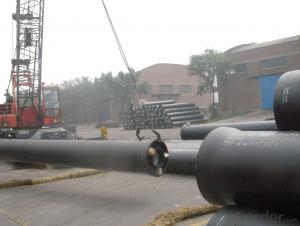DUCTILE IRON PIPE AND PIPE FITTINGS K7 CLASS DN1400
- Loading Port:
- Tianjin
- Payment Terms:
- TT OR LC
- Min Order Qty:
- 23 pc
- Supply Capability:
- 3000 pc/month
OKorder Service Pledge
OKorder Financial Service
You Might Also Like
· Material : Ductile Cast Iron
· Size Range : DN 80mm to DN 2000mm
· Unit Effective Length : 6m or 5.7m
· Manufacture Standard: ISO 2531:1998/ EN 545:2006/EN 598:2007
· Annual capacity : 200,000 tons
· Coating Exterior: Zinc 130g/m2 according to ISO 8179-1 and bitumen coating 70 microns.
· Cement Interior: Portland Cement/ High Alumina Cement/ Sulphate Resisting Cement Lining according to ISO 4179
· Special requirements on external coating and internal lining can be applied
· We also provide accessories such as SBR/EPDM rubber gaskets, lubricant paste, pipe caps, PE sleeves, etc.
Additional Parts:
Each pipe is strictly inspected according to related standard to ensure permanently high performance.
Easy Installation at site and service free for life
Long Service Lifespan
Quotation will arrive you within 24hours once we get your inquiry.
We guarantee offering you a competitive price.
A copy of original inspection reports of pipes will be offered after shipment.
Photos of loading process will be sent to the customer after shipment effect.
We will follow-up the delivery progress after shipment effect and update to the customer on weekly basis.
- Q:Ductile iron pipe is how many years warranty
- Ductile iron pipe warranty is unlimited.
- Q:Can ductile iron pipes be used for offshore oil and gas installations?
- Offshore oil and gas installations can utilize ductile iron pipes. Ductile iron, a cast iron variant, possesses exceptional strength and durability, rendering it suitable for diverse applications, including offshore environments. These pipes exhibit high tensile strength and corrosion resistance, making them ideal for transporting oil and gas amidst harsh offshore conditions. In subsea pipelines, risers, and flowlines, ductile iron pipes are frequently employed due to their capacity to endure high pressures and withstand external forces like waves, currents, and impacts. Moreover, they can handle the elevated temperatures and pressures associated with offshore oil and gas production. Furthermore, ductile iron pipes boast a lengthy service life and require minimal maintenance, thereby reducing overall operating costs for offshore installations. They are also readily available and cost-effective when compared to alternative materials such as steel. Nevertheless, it is crucial to consider project-specific requirements, environmental conditions, and the compatibility of ductile iron with other materials utilized in the offshore installation. Proper engineering analysis and design considerations are necessary to ensure the suitability and safety of ductile iron pipes for offshore oil and gas installations.
- Q:Do ductile iron pipes require internal linings for potable water?
- No, ductile iron pipes do not require internal linings for potable water. Ductile iron is a type of iron that has been treated to enhance its strength and flexibility. It is commonly used for water distribution systems due to its durability and resistance to corrosion. Unlike other materials, such as cast iron or steel, ductile iron pipes have a protective layer called a cement-mortar lining, which provides an effective barrier against corrosion and prevents the leaching of any harmful substances into the water. This lining is applied during the manufacturing process and is designed to withstand the corrosive properties of potable water, making internal linings unnecessary. Additionally, the smooth surface of ductile iron pipes helps to maintain the quality and flow of water without the need for additional linings.
- Q:What material is ductile cast iron 235A?
- Nodular cast iron by spheroidization and inoculation by spherical graphite, effectively improve the mechanical properties of cast iron, especially the plasticity and toughness increased, resulting in higher than carbon steel. The strength of nodular cast iron is a kind of high strength cast iron material developed in 50s twentieth Century, its comprehensive performance is close to the steel. It is based on its excellent performance, has been successfully used in casting complex stress, strength, toughness and wear resistance requirements of the higher parts. Ductile iron has been the rapid development of cast iron material for application of gray cast iron, only very widely. The so-called "iron steel", mainly refers to the ductile iron.
- Q:Classification of cast iron pipes
- Continuous cast iron straight pipe:Continuous cast iron pipe, namely continuous casting gray cast iron pipe, suitable for water and gas pressure fluid delivery.
- Q:What is the expected joint deflection of ductile iron pipes?
- The expected joint deflection of ductile iron pipes depends on various factors such as the diameter of the pipe, the type of joint used, and the specific conditions of the installation. In general, ductile iron pipes are designed to accommodate some degree of deflection at the joints to allow for flexibility and movement. The American Water Works Association (AWWA) provides guidelines for the maximum allowable joint deflection for ductile iron pipes. According to AWWA C151/A21.51, the maximum deflection at the joint should typically not exceed 3 degrees or 1% of the nominal pipe diameter, whichever is greater. It is important to note that joint deflection should be within the specified limits to ensure the structural integrity and performance of the pipeline system. Excessive joint deflection can lead to leaks, failures, and reduced lifespan of the pipes. To determine the exact expected joint deflection for a specific installation, it is best to refer to the manufacturer's specifications and guidelines, as they may vary depending on the pipe size, joint type, and other factors. Consulting with a qualified engineer or contacting the manufacturer directly can provide more accurate information tailored to the specific project requirements.
- Q:Can ductile iron pipes be made of flexible waterproof sleeves?
- The casing can be divided into ordinary casing to be 2-4 cm thick than the pipe to be used and fixed to the wall or plate, and the pipe passes through it. Flexible bushing - between the casing and pipe, with flexible material to seal the sealing effect. Rigid casing - that is, between the casing and pipe with rigid material sealed to achieve sealing effect. Waterproof casing - is the use of the casing of the environment is to prevent liquid leakage or leakage into place (such as the pool, septic tanks, basement, etc.) is on the outer wall of the bushing is not less than 1 times increase waterproof wing, this wall is poured in the casing as a whole, not because of swelling shrinkage factor and crack and leakage.
- Q:How are ductile iron pipes connected or jointed together?
- Ductile iron pipes are typically connected or jointed together using various methods such as flanged joints, push-on joints, mechanical joints, or restrained joints. These methods ensure a secure and leak-free connection between the pipes, providing a reliable and durable pipeline system.
- Q:Can ductile iron pipe be used for nuclear power plants?
- Certain applications within nuclear power plants can utilize ductile iron pipe. Ductile iron pipe is renowned for its strength, durability, and resistance to corrosion, which makes it suitable for a variety of industrial and infrastructure projects. However, when considering nuclear power plants, specific factors must be taken into account. Safety and reliability of materials used in nuclear power plants are of utmost concern. Although ductile iron pipe meets many requirements, it may not be the optimal choice for critical applications involving the transportation of radioactive fluids or the handling of high-pressure or high-temperature systems within the plant. These particular applications often necessitate materials with exceptional resistance to corrosion, stress, and radiation damage. Materials such as stainless steel, nickel alloys, or even specialized materials like Inconel are commonly employed in nuclear power plants due to their superior properties. These materials offer enhanced resistance to radiation-induced embrittlement, corrosion, and high-temperature and high-pressure conditions. Therefore, while ductile iron pipe may find utility in non-critical applications within nuclear power plants, it is crucial to consult industry experts, engineers, and adhere to relevant nuclear safety regulations in order to determine the most suitable materials for specific applications within the plant.
- Q:How do ductile iron pipes perform in high-temperature steam applications?
- Ductile iron pipes excel in high-temperature steam applications thanks to their remarkable performance. They can withstand elevated temperatures and maintain their structural integrity, making them highly suitable for steam distribution systems. One notable advantage of ductile iron pipes in high-temperature steam applications lies in their exceptional thermal conductivity. This property enables efficient heat transfer, ensuring that the steam is delivered at the desired temperature with minimal loss. Additionally, the high thermal conductivity of ductile iron helps to mitigate the risk of thermal expansion and contraction, which can lead to pipe failure or leakage. Moreover, ductile iron pipes boast a high melting point, typically around 2000°F (1093°C). This resistance to extreme temperatures encountered in steam applications ensures that the pipes remain intact and do not deform, guaranteeing the reliability and longevity of the piping system. Another crucial factor contributing to the performance of ductile iron pipes in high-temperature steam applications is their corrosion resistance. These pipes are usually coated with epoxy or other protective materials to prevent corrosion and maintain their structural integrity, even in aggressive steam environments. This corrosion resistance ensures that the pipes can endure harsh conditions and operate efficiently over an extended period. In conclusion, ductile iron pipes are an ideal choice for high-temperature steam applications due to their excellent thermal conductivity, high melting point, and corrosion resistance. These properties make them a reliable and long-lasting option for steam distribution systems, ensuring the safe and efficient transportation of steam at elevated temperatures.
1. Manufacturer Overview |
|
|---|---|
| Location | |
| Year Established | |
| Annual Output Value | |
| Main Markets | |
| Company Certifications | |
2. Manufacturer Certificates |
|
|---|---|
| a) Certification Name | |
| Range | |
| Reference | |
| Validity Period | |
3. Manufacturer Capability |
|
|---|---|
| a)Trade Capacity | |
| Nearest Port | |
| Export Percentage | |
| No.of Employees in Trade Department | |
| Language Spoken: | |
| b)Factory Information | |
| Factory Size: | |
| No. of Production Lines | |
| Contract Manufacturing | |
| Product Price Range | |
Send your message to us
DUCTILE IRON PIPE AND PIPE FITTINGS K7 CLASS DN1400
- Loading Port:
- Tianjin
- Payment Terms:
- TT OR LC
- Min Order Qty:
- 23 pc
- Supply Capability:
- 3000 pc/month
OKorder Service Pledge
OKorder Financial Service
Similar products
New products
Hot products
Related keywords


























